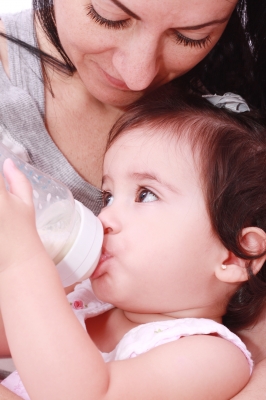
 For years those of us concerned about reducing the toxic load we’re all carrying everyday have been pushing to get BPA out of our daily products. A chemical used to make plastics, BPA has been linked to breast cancer, prostate cancer, hormone disruption, developmental problems, neural and behavioral effects in infants and children, and more.
For years those of us concerned about reducing the toxic load we’re all carrying everyday have been pushing to get BPA out of our daily products. A chemical used to make plastics, BPA has been linked to breast cancer, prostate cancer, hormone disruption, developmental problems, neural and behavioral effects in infants and children, and more.
BPA can be found in bottles, sippy cups, formula cans, other canned goods, plastic bottles, plastic food containers, dental sealants, canned sodas and beer, aluminum reusable water bottles, and more. In 2010, the FDA made a tiny move forward when they stated they had “some concern” about exposure to BPA. Now, in a bigger step forward, the agency has issued an outright ban on BPA in baby bottles and drinking cups
FDA Bans BPA in Infant Formula Packaging
In early July 2013, the FDA announced a ban on the toxic chemical BPA from infant formula packaging. This was after three states-Connecticut, Vermont, and Maryland-had already passed their own bans on the chemical in these products. Though it’s a step in the right direction, it’s been a long time coming and demonstrates the glacial movement of government agencies on these types of concerns.
According to the agency: “The Food and Drug Administration (FDA) is amending the food additive regulations to no longer provide for the use of Bisphenol A (BPA)-based epoxy resins as coatings in packaging for infant formula because these issues have been abandoned. We are taking this action in response to a petition dated March 16, 2012.”
The petition was filed by Rep. Edward Markey (D-Mass.), who called the ban “a major victory for America’s families.” The rule will take effect immediately.
New Ban Follows Last Year’s Ban on BPA in Baby Bottles
This ban follows a previous ban made last year on BPA in baby bottles. On Tuesday, July 16, 2012, the FDA stated that baby bottles and children’s drinking cups could no longer contain bisphenol A, or BPA, an estrogen-mimicking chemical used in some plastic bottles and food packaging.
At that point, however, manufacturers had already stopped using the dangerous chemical in these products, but the FDA ban made it official that the chemical’s presence would no longer be tolerated. The FDA noted that the decision was made in response to a request by the American Chemistry Council. According to Michael Taylor, deputy commissioner for foods at the FDA, the decision “solidifies legally that the use will not happen again in the future” in baby bottles and cups for toddlers.
Unfortunately, neither ban reaches far enough. Other products, such as canned goods and plastic food containers, may still contain the chemical. In fact, Taylor stated that based on all the evidence, the FDA still supports the safe use of BPA.
Protection Groups Pushing for Additional Action
According to the Centers for Disease Control and Prevention (CDC), there is widespread exposure to BPA in the U.S. population, with nearly all people tested showing measurable levels of BPA in their urine. People are exposed through eating food or drinking water stored in containers that have BPA, or by contacting other materials that contain the chemicals. Dental treatment with BPA-containing sealants also results in short-term exposure.
Consumer protection groups like the Breast Cancer Fund are pushing for further action on the chemical to protect not only children’s health, but the health of the public at large. “The writing is on the wall for canned food makers,” said Janet Nudelman, director of program and policy at the Breast Cancer Fund. “If the entire infant-formula industry was able to go BPA-free, there is no earthly reason why canned food manufacturers can’t follow suit.”
Critics claim the FDA is not doing enough to protect public health. “The FDA is slowly making progress on the issue,” said Diana Zuckerman, president of the National Research Center for Women and Families, “but they are doing the bare minimum here. They are instituting a ban that is already in effect voluntarily.”
To protect yourself against this chemical, don’t wait for further government action. Take these steps now.
- Avoid canned foods when possible. Choose fresh and frozen produce, and go for processed foods in cartons, pouches, or glass.
- Limit your intake of canned sodas and beer-choose glass instead.
- If you have a young child, avoid baby bottles made of shatterproof plastic. See our post for more information.
- Since BPA levels can’t be predicted by the price of the product, the quality, the nutritional value, or where it was purchased, choose canned foods only from manufacturers who are going BPA-free, like those who package in glass jars, or brands like Wild Planet canned tuna, Eden Organic beans, or Lucini Italia Organics.
- Use a stainless steel water bottle instead of plastic.
Do you try to reduce your exposure to BPA? What do you think of this ban?
Picture courtesy David Castillo Dominici via freedigitalphotos.net.
Sources
“Baby Step Toward Full Ban on BPA in Food Packaging,” Breast Cancer Fund, July 11, 2013, http://www.breastcancerfund.org/media/press-releases/fda-bpa-ban-july-2013.html.
Sabrina Tavernise, “FDA Makes it Official: BPA Can’t be Used in Baby Bottles and Cups,” New York Times, July 17, 2012, http://www.nytimes.com/2012/07/18/science/fda-bans-bpa-from-baby-bottles-and-sippy-cups.html?_r=0.
“Bisphenol A (BPA) Factsheet,” CDC, http://www.cdc.gov/biomonitoring/BisphenolA_FactSheet.html.
http://www.ofr.gov/OFRUpload/OFRData/2013-16684_PI.pdf
Ben Goad, “FDA bans BPA in baby formula packages,” The Hill’s RegWatch, July 11, 2013, http://thehill.com/blogs/regwatch/legislation/310427-fda-bans-bpa-in-baby-formula-packages-.

